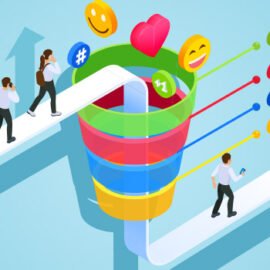
|
Getting your Trinity Audio player ready... |
Invest in offline or online? Inbound with or without outbound? The life of a marketer is full of these dilemmas.
And it's no different when I talk to my clients. In an increasingly digital world, this question arises in 10 out of 10 marketing professionals.
Let's start by analyzing some characteristics of traditional advertising and its use in offline media.
Traditional advertising
In traditional advertising, the focus is on capturing attention. It's about attracting those who are present on electronic media (TV, radio, even a website) or are browsing a magazine or newspaper.
Or, for those leaving home, outdoor or indoor media (billboards, banners, panels, media in elevators, etc…).
Let us note that this is a strategy of massive and often dispersive presence. And this happens even if it is done in segmented media, such as cinema (the practically perfect attention media) or pay TV. At this moment, the public does not intend to pay attention to what is being shown to them.
Digital marketing as attracting attention
At the digital marketing, when we focus on content or paid advertising (sponsored links on Google or Facebook Ads) we are doing the opposite. The message is focused on those who are already interested in the product/service/brand.
Even if it is an email marketing campaign, just Click for those who already have a certain interest in the subject. The path, therefore, is the opposite. It is not the media that attracts attention, but the user is the one who searches and ends up finding what they need.
The offline or online They are two different ways of communicating with the target. But the main point to be asked is: does what is being offered or sold solve this prospect’s problem? Is the communication really clear regarding this solution?
In times of tight budgets, the message must be aligned with the client/prospect's expectations more than ever.
We must see if, in fact, we are fulfilling the task of communicating to this public the differences and solutions we are offering them. And it will be in accordance with this communication that we will define where to direct media planning.
Outbound marketing as a complementary tool
Nowadays we also hear about outbound. But what exactly is it? Outbound is the complement to inbound marketing. This is an acceleration of leads that may be likely to consume your product or service.
Whether offline or online, digital marketing and content must be present
I am an advocate of cross media as a way to drive results. And, more than ever, I believe that digital marketing and content marketing must be part of any campaign’s media plan.
So, let's see:
- digital marketing allows for better measurement of ROI;
- the cost of acquiring customers can fall by using tools and strategies that attract customers who are already looking for the solution;
- building an email base on your website through content marketing makes your results optimized;
- you can build a relationship with your customer much more efficiently by using social media correctly;
- and, joining point number one to point number two of the question... content marketing presents, better than any other marketing tool, all the qualities and benefits of your product/brand/service, informing, educating and adding value.
And all of this can be done with the support of traditional media, which can direct your audience to the website/blog/application.
If your brand/product/service is used to wide-reaching media, why not optimize some of your budget for digital, thinking that the most important thing nowadays (in challenging times then) is to retain the customer and invest in marketing. results?
Think about it carefully. Cross media with intelligence. And with content.
Per Marcel Castilho

Marcel Castilho is a specialist in digital marketing, neuromarketing, neuroscience, mindfulness and positive psychology. In addition to being an advertiser, he also has a Master's degree in Neurolinguistic Programming. He is the founder, owner and CEO of Vero Contentes and the offline agency VeroCom.




Comments are closed.